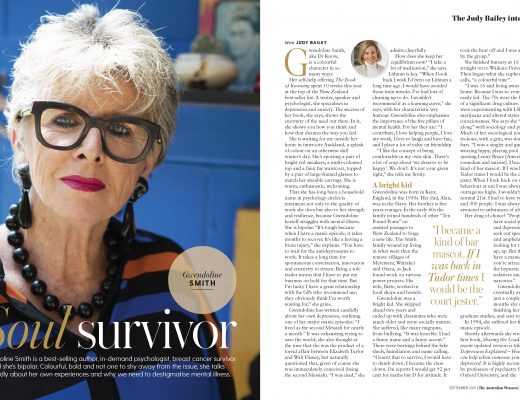I was recently interviewed for the NZ Law Society.
29 October 2018
As a part of Mental Health Awareness week 8-14 October, the Law Society Auckland Branch recently held a Well-Being Seminar in Auckland. The seminar was presented by Gwendoline Smith, a psychologist, speaker and writer, who specialises in working to help people overcome anxiety and depression.
Gwendoline is a very experienced speaker and lecturer on all topics, from serious material or humorous entertainment to rugby clubs. She is the author of Will the Real Mr. New Zealand Please Stand Up, Sharing the Load – what to do when someone you love is depressed, Depression Explained, Breast Support and with the recent publication of her latest book Knowing – when you know how you think you get to change how you feel, she has been speaking to schools, teachers and school guidance counsellors on dealing with youth anxiety.
The Law Society Auckland Branch talks to Gwendoline about mental health and her tips on coping with stress and anxiety.
According to the Mental Health Foundation, one in five New Zealanders will experience mental health issues in any given year. What are, from your experience, some of the main causes of stress and anxiety nowadays?
Firstly, I would like to make the point that there is a strong genetic component when it comes to anxiety, even more so than with depression. Hence, some people are more biologically sensitive to environmental strain. That aside, today’s world has many differences from, say, the Twentieth century – nowadays we as clinicians are better at diagnosing mood disorders. Anxious people may once have been described as excessive worriers. Depressives may have been seen as just being grumpy and pessimistic. The other noteworthy consideration is that human beings are expert at self-medication; booze, gambling, drugs, legal and illegal, etc.
Global phenomena also take their toll. Primarily, when I am commenting on the increasing and epidemic numbers of depression, suicide and anxiety, I refer to the First World. There are millions of people worldwide who don’t even have fresh water and live in refugee camps. They are suffering. Are they depressed, quite probably, but if it’s a toss-up between food and an anti-depressant, it’s a no brainer.
The Twentieth century also saw two World Wars, food was rationed, and people were losing family members every day, but stoicism had to be maintained to contribute to the war effort.
What factors are in play at the moment? Performance stress, financial stress, high divorce rates, and families have to have both parents working to make ends meet. There are many psychological contributors; negative perfectionism, need for approval, fear of judgement.
“It’s not stress that kills us, it’s our reaction to it.” Hans Seyle (Father of stress research)
For a lot of people struggling with mental health it can be very difficult to talk about it or they are reluctant to seek help. How do we encourage a more open discussion?
The Like Minds Campaign (of which I am the founder) was a significant initiative for national destigmatisation of mental health. The use of John Kirwan also showed some success in reaching more men, traditionally slow presenters to primary health care services. Mental Health Awareness week also encourages community awareness. In my opinion the thrust of destigmatisation belongs in schools, as attitudes are formed in the youth. However, I do not believe that this education should be placed solely with teachers as they are burdened enough with taking on important social issues.
What are some of the practical ways to help people who are struggling?
If there is family concern about depression or anxiety, the first port of call is the family GP. Medical practices have a list of psychological health providers and psychiatrists that they can refer people to via Procare. They also have a list of more affordable practitioners and there is government subsidised funding for up to six sessions. Community mental health centres also provide outpatient and non-crisis care, but their resources are also stretched.
Some people, such as lawyers, work in stressful environments and often have high demands on, and even higher expectations of, their own performance. What is the best way to manage their clients’ demands and their own expectations whilst minimising the risk of stress or anxiety?
This question raises the issues of people skills for lawyers. It is not my impression that there is sufficient education for student lawyers on how to deal with these matters. Looking at the research, for this presentation, it would appear that internationally, depression and anxiety are present whilst students are studying, they come into the profession with very few, if any skills on how to manage such issues. This would be something for the Law Schools to address.
What are some of the areas which could be improved in the way that we deal with mental health issues in New Zealand?
I believe that the Ministry of Health & Education need to place more funding into resources for this form of psychoeducation. I know this to be true from the education on youth anxiety that I am currently involved with, teachers, correspondence teachers and school guidance counsellors. They face an epidemic of anxiety and youth suicide with no training or resources.
Your Corporate Training programmes are specifically tailored for the needs of the organisations. What are some of the common strategies you use in your programmes for people in the legal profession?
I borrow primarily from the school of Cognitive Behavioural Therapy. During its evolution a school of Cognitive Coaching has emerged. This is more specifically designed to address issues to do with workplace stress. Although the fundamental principles remain the same, case scenarios and strategies are formulated to deal with the idiosyncrasies of the work environment. The language is also adjusted to deal with cognitions that are either “performance enhancing or performance impairing”. Hence the language steers intentionally away from a “sickness” model. Corporations do not respond well to concepts that address ‘sickness’. However, it cannot be overlooked that the majority of problems in the workplace are ‘people problems’.
From your experience, are there any major differences in the way that men and women deal with stress?
I like to see human beings as “Earthlings” of course there are gender differences in many aspects of the psychological and emotional world. (e.g. the part of gender-specific hormones) However, my treatment methodology remains consistent across the genders. Men do tend to be more reluctant to present for treatment, but this has changed over recent times.





No Comments